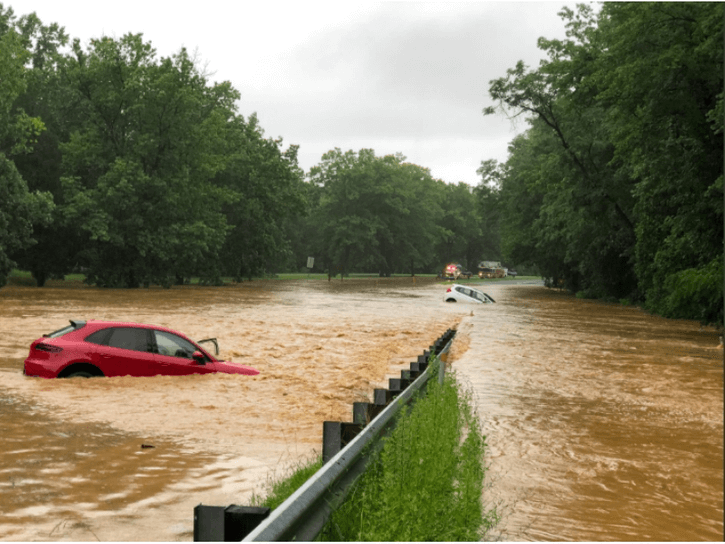Md. Climate Commission Seeks More Ambitious Plan, But Some Say It’s Still Not Enough

As Maryland seeks to reduce greenhouse gas emissions, some lawmakers and advocates contend that the state will be especially vulnerable to warmer weather, sunny-day flooding, and sea-level rise along the Eastern Shore if the state does not adopt a more ambitious climate change plan.
In its annual report to Gov. Lawrence J. Hogan Jr. (R), released earlier this week, the Maryland Commission on Climate Change recommended that the state reach at least a 50% reduction in statewide greenhouse gas emissions by 2030 and achieve net-zero greenhouse gas emissions by 2045. Currently, Maryland’s Greenhouse Gas Emissions Reduction Act requires the state to achieve at least 40% reduction by 2030.
The commission, chaired by Maryland Department of the Environment Secretary Ben Grumbles, is responsible for advising the governor and General Assembly on ways to mitigate the impacts of climate change. It is made up of members from various state agencies, environmental groups, organized labor and business.
“Maryland continues to make real progress in finding common ground for common sense solutions to our environmental challenges, and this report reflects that commitment,” Grumbles said in a statement.
Senate Education, Health and Environmental Affairs Committee Chairman Paul G. Pinsky (D-Prince George’s), who is also part of the commission, said that he was pleased to see an acknowledgement that a 40% greenhouse gas reduction goal was not nearly enough. Still, the commission’s recommendations to combat climate change in Maryland were not as aggressive as they need to be, he said.
For instance, transportation is the largest source of greenhouse gases in Maryland and even though the report showed support for the Transportation & Climate Initiative (TCI), an effort by 12 Northeastern states and the District of Columbia to commit to clean energy goals, no concrete plans had been set.
“It’s great, but until actual numbers are put in, it’s hard to know how big of a commitment it is,” Pinsky said. The state should lead by example and transform all state agency vehicles into zero emission vehicles, he continued.
The report highlighted Maryland’s effort to decarbonize new trucks, particularly its memorandum of understanding with 14 other states and the District of Columbia to reach a goal to make all sales of new medium and heavy duty vehicles zero emission vehicles by 2050.
Trucks and buses account for a quarter of greenhouse gas emissions from the transportation sector and are major sources of pollution that creates smog, according to the report.
But the report did not recommend that the state expand mass transit or seek to reduce the number of cars and trucks on the road. Owen Silverman Andrews, the co-chair of the Baltimore City Green Party, pointed out that while the term “transit buses” is mentioned in the report, it is not in the context of expanding public transportation, but only when talking about purchasing. In fact, Hogan still wants to widen two interstate highways in the Washington, D.C., region.
On electricity, the commission recommended that the state allow Marylanders to choose lowest cost energy systems, especially to replace propane or oil heating systems with electric heating pumps. As a way to lead by example, all state buildings should be electrified and decarbonized, the report stated. Maryland currently has an agreement with North Carolina and Virginia to advance offshore wind energy projects.
Some environmental groups praised the report, particularly for its recommendation that the state transition away from coal by 2030 and its new greenhouse gas reduction goal.
“It’s exciting to see the Commission recognize the unsustainable and uneconomic nature of the coal industry and call on the General Assembly to move the state entirely off coal-fired power plants in the coming years while supporting impacted workers and communities in that transition,” David Smedick, the Maryland senior campaign representative for the Sierra Club’s Beyond Coal Campaign, said in a statement.
“The report’s groundbreaking recommendations to begin transitioning off fossil fuels in our homes and businesses by heating our buildings with systems that use clean electricity is a necessary change that’ll produce safer, healthier and more climate-friendly buildings,” he continued.
The commission also suggested that the Maryland Department of the Environment not only identify environmental and climate justice communities that have suffered from or been vulnerable to pollution and other negative environmental impacts, but also prioritize benefits to those communities.
But critics argue that some of the recommendations lack concrete steps. “It mostly seems like a plan to create plans, or to align with plans that don’t go far enough,” said Dante Swinton, a researcher based in Baltimore for Energy Justice Network, a grass-roots environmental organization. “[The Transportation & Climate Initiative], for example, doesn’t cover the transfer of waste from one state to another, and that is very problematic if the goal is to minimize disproportionate impacts of waste management on communities of color and low-income communities.”
The recent success in combatting climate change, such as moving away from oil and coal and towards natural gas, happened because of the changing market economy, not because of any concrete state actions, Pinsky said.
Greenhouse gas emissions have been low for the last eight months, but that’s because more people are working from home due to the COVID-19 pandemic, Pinsky continued. “A lot of these successes in the last couple of years have actually been because of externalities, not because of action by government.”
“We can’t be passive. We’ve seen the fires in California, we’ve seen flooding in Texas and Louisiana…it’s not going to get any better,” Pinsky said. “It’s a real problem that needs real steps.”




 Creative Commons Attribution
Creative Commons Attribution